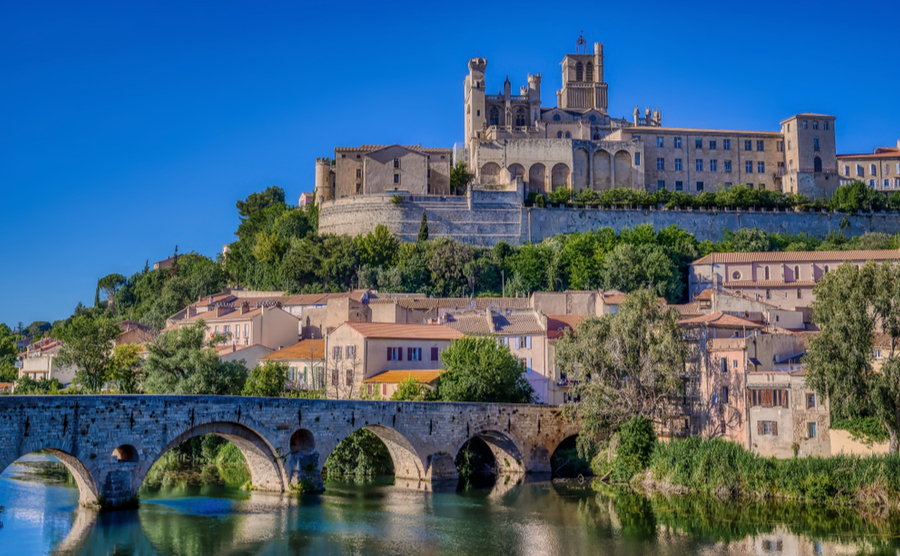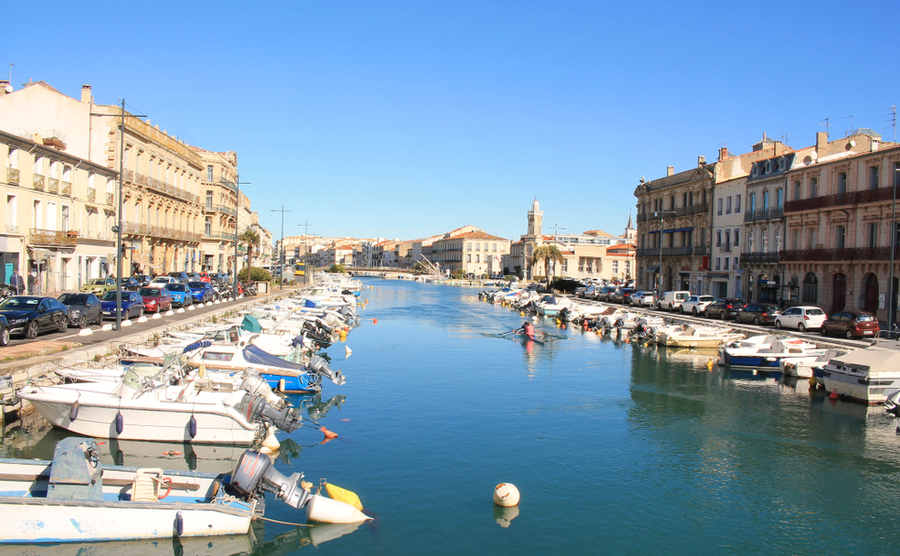Buying property in Occitanie

Occitanie is a large region in south-central France. Why is it named “Occitanie”? It joined the old regions of Languedoc-Roussillon and Midi-Pyrénées in 2016, which were historically linked by the language Occitan.
At nearly 73,000 square kilometres it’s almost the size of Scotland, and with a similar popular – around six million. It also has plenty of mountains – covering most of the French side of the Pyrenees. But unlike Scotland it also has a beautiful Mediterranean coast, stretching for 200km all the way from Spain to the Rhone and the Camargue, where it joins Provence.
Property buyers in Occitanie can choose major cities such as Toulouse (with nearly half a million people), Montpellier, Nimes and Perpignan, or a home in a pretty village such as Martel or Moustiers-Sainte-Marie, or amongst the many miles of rolling hills and the mountains of the Pyrenees. The coast named the Côte d’Améthyste (Amethyst coast), includes attractive seaside towns as Collioure.
Why buy property in Occitanie?
An area this size if hard to characterise, but whatever you want you can find it in Occitanie. From 3,000metre mountains to rolling hills, sandy beaches, pretty villages that have attracted the world’s greatest artists to busy cities like Toulouse, Europe’s aerospace industry hotspot and headquarters of Airbus.
Towns like Moissac offer enchanting historical sites such as the Abbey of Saint Pierre, while Bagnères de Bigorre is celebrated for its gastronomy and spa resorts.
Millau provides a serene environment free from through traffic, and Céret exudes the essence of French life with its cultural events and proximity to the Mediterranean beaches.
The climate is generally sunny, especially in the south, where residents enjoy around 300 sunshine days per year, making it an attractive destination for those seeking a tranquil and picturesque setting.

Sete, a seaside resort in the Herault, France
Understanding the property market
Occitanie is sandwiched between several other popular regions: Provence-Alpes-Côte d’Azur to the east, Nouvelle-Aquitaine to the west and Auvergne-Rhone-Alpes to the north.
The location is popular among foreign buyers looking to buy property somewhere they can enjoy the Côte d’Azur’s pleasant climate and the affordability of central France.
The Mediterranean sections, with popular locations such as Béziers and Carcassonne in the Aude and Pyrénées-Orientales, have as many as 5% international owners, while the Lot, up in the north of Occitanie, has more than 5%
The good news is that it is perfectly possible to buy a good-sized home with a garden for under €150,000 in many parts of Occitanie.
The Hérault lies in the centre of Occitanie and is an increasingly popular location with international buyers due to its affordability. It offers the best of both rural France and seaside resort towns.
Other departments in Occitanie include Ariège, Aude, Aveyron, Gard, Haute-Garonne, Gers, Lot, Lozère, Hautes-Pyrénées, Pyrénées-Orientales, Tarn and Tarn-et-Garonne.
Overall, the region presents excellent value for money in terms of real estate, for instance, Moissac features properties such as traditional farmhouses and ancient “pigeonniers” within a budget of around €200,000.
In contrast, areas like Bagneres de Bigorre and Millau, known for their older-style homes, require a budget closer to €250,000. The picturesque village of Ceret, due to its desirable location and beauty, commands higher prices, with small old houses starting at around €200,000 and more substantial homes going for approximately €300,000.
Steps to buying property in Occitanie
- Define your criteria: Determine what you’re looking for in terms of property type, location, budget and must-have features.
- Research: Use online resources, visit local real estate agencies and explore the area to find properties that match your criteria. Book your place at the Your Overseas Home Virtual Event.
- Speak to a currency expert: Moving exchange rates are a risk in international property purchases, so discuss managing that risk with a forward contract that fixes your exchange rate.
- Legal considerations: Familiarise yourself with the French property buying process, including the role of the notaire , who handles the legal aspects of the sale. Contact an independent lawyer at this stage.
- Financing: Investigate mortgage options if required. French banks offer loans to non-residents, but it’s advisable to compare rates and terms.
- Book your viewing/scouting trip: Download the guide, contact estate agents an book your tickets.
- Making an offer: Once you find a property you like, you can make an offer. If accepted, you’ll sign a preliminary contract (compromis de vente or a promesse de vente) and pay a deposit.
- Completion: The final sale is completed when the acte de vente is signed at the notaire’s office, and the balance of the purchase price is paid.
Costs involved
When buying property in Occitanie, the buyer is responsible for notaire fees, which average 7-8% of the property price (or 2-3% for new homes) and will have to also consider estate agent fees (although often included in the property price) and homeowner taxes.
You might also like:

